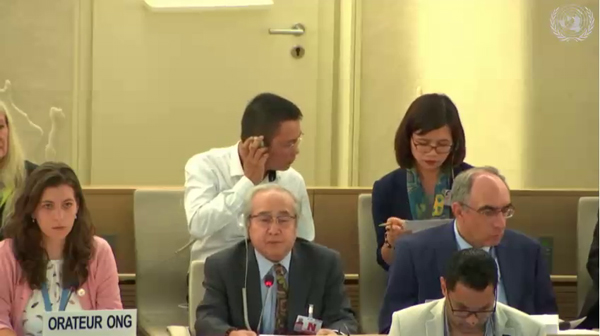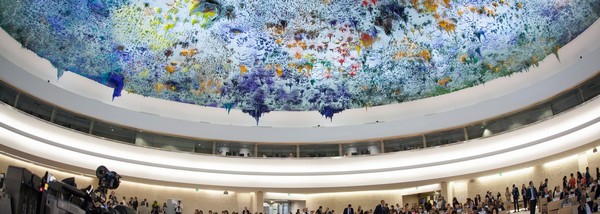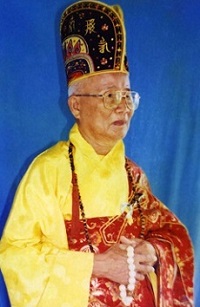GENEVA, 4 July 2019 (VCHR) – Speaking at the UN Human Rights Council’s 41st session in Geneva on behalf of FIDH and the Vietnam Committee on Human Rights (VCHR) today, VCHR President Võ Văn Ái deplored the “wide gap” between Vietnam’s reports and statements to the UN and the “frightening reality faced by Vietnamese people in their daily lives”. He said Vietnam was abusing the Universal Periodic Review (UPR) process to misinform the international community about serious human rights violations on the ground.
Mr. Ái was commenting on the report on the third UPR of Vietnam which was adopted today by the UN Human Rights Council. Out of 291 recommendations made by member states at Vietnam’s UPR review in January 2019, Vietnam announced it would accept 241 recommendations (nearly 83%), in whole or in part. However, 50 key recommendations for prompt and concrete action to improve human rights were categorically rejected by the communist state.
“A close reading of [Vietnam’s] reservations and 50 non-accepted recommendations shows that Vietnam has no political will to address the serious violations of civil and political rights in the country”, Võ Văn Ái told the UN Human Rights Council.
On Thursday, FIDH and VCHR issued a joint statement analysing in detail Vietnam’s responses to the UPR and condemning the government’s refusal to commit to human rights reforms.
The 50 recommendations rejected by Vietnam included demands to release all human rights defenders, bloggers, political and religious activists detained for the peaceful expression of their opinions and beliefs; to prosecute perpetrators of violence and intimidation against human rights defenders; to authorize independent monitoring bodies to inspect conditions in Vietnam’s prisons and camps; to lift all restrictions on the right to freedom of opinion and expression, both online and offline; and authorize the publication of independent newspapers.
It also rejected recommendations to amend the Cyber Security Law, Press Law, Law on Belief and Religion and the Criminal Code in order to guarantee freedom of expression and freedom of religion or belief; to work with businesses and civil society on an action plan to implement the UN Guiding Principles on Business and Human Rights; to accept a visit by the Special Rapporteur on Torture; to initiate a moratorium on the death penalty; to ratify ILO Convention 87 on freedom of association and the right to organize.
Mr. Ái particularly denounced Vietnam’s refusal to accept the demands of many states to revise or repeal the broadly-defined “national security” provisions in the Criminal Code which he described as “the cornerstone of government repression” in Vietnam.
Justifying its refusal to amend the Cyber Security Law, the Law on Religion and Belief, Vietnam claimed that the public had been “consulted extensively” before their adoption. In reality, thousands of people demonstrated in June 2018 to demand the withdrawal of the draconian Cyber Security Law, which gravely restricts Internet freedom. The law was adopted nevertheless, and hundreds of protesters were arrested and convicted. Just last week, on 28th June, Trương Hữu Lộc was sentenced to eight years in prison for taking part in the demonstrations.
Similarly, the government took no heed of strong protests by religious communities on the Law on Belief and Religion. Since the law came into effect in January 2018, repression against all religious communities in Vietnam has intensified, especially against non-recognized groups such as the Unified Buddhist Church of Vietnam (UBCV), certain Protestant house churches, Hòa Hảo, Cao Đài, Khmer Krom Buddhists etc.
Not surprisingly, Vietnam rejected a recommendation by Czechia to “lay the ground for political plurality and democracy” and guarantee its citizens “the full enjoyment of the rights to vote, to be elected and to take part in the conduct of political affairs”. This was one of seven recommendations singled out by Vietnam as “contentious”, “inaccurate” and “alien and improper” in regards to the people’s right to self-determination.
“What does the government mean by self-determination?” asked Võ Văn Ái. “How can Hanoi know what the Vietnamese people want when they refuse the very idea of letting the people express themselves freely and participate in public affairs?”
In conclusion, Mr. Ái dedicated his statement to Thích Quảng Độ, leader of the outlawed UBCV and to all human rights defenders in Vietnam. Thích Quảng Độ, 92, has spent decades under detention for his engagement for human rights, democracy and freedom of religion or belief.
Oral Statement to the UN Human Rights Council
Point 6, Adoption of the UPR Report on Vietnam
read by VCHR President Võ Văn Ái
Mr. President,
FIDH and its member organisation VCHR are deeply disturbed by the wide gap between the Vietnamese government’s rhetoric and the frightening reality faced by Vietnamese people in their daily lives.
The reality is that today Vietnam holds over 130 prisoners of conscience, one third more than those detained last year.
The reality is that large-scale repression of peaceful demonstrations, often by government-hired thugs, continues to occur.
The reality is that persecution against religious communities remains pervasive.
The reality is that systematic harassment, arrest, and lengthy prison sentences for human rights defenders is relentless.
The reality is that more restrictive laws and regulations, such as the Law on Belief and Religion, the Cybersecurity Law, and the Press Law, have been adopted.
In this UPR cycle, Vietnam accepted, either wholly or in part, almost 83% of the recommendations it received. However, a close reading of its reservations and 50 non-accepted recommendations shows that Vietnam has no political will to address the serious violations of civil and political rights in the country.
The Vietnamese government rejects references to “national security”, which is the cornerstone of government repression, as well as recommendations to protect human rights defenders or amend laws that restrict human rights. It invokes “Vietnam’s circumstances” to justify the non-implementation of the UN Convention against Torture.
It rejects very important recommendations deemed to be, I quote, “contentious”. In fact, the so-called “contentious” terms rejected by Vietnam are “human rights defenders”, “Paris Principles”, “abolishing censorship”, “independent media”, and “political plurality and democracy”.
Finally, contrary to Vietnam’s claim that it cooperates with the Special Rapporteur on Freedom of Expression, requests for an in-country visit submitted by this mandate since 2002 have received no reply from Hanoi.
I dedicate this statement to Thich Quang Do and all human rights defenders in Vietnam.
Thank you Mr. President,







0 Comments
You can be the first one to leave a comment.